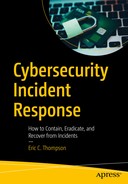Book Description
Create, maintain, and manage a continual cybersecurity incident response program using the practical steps presented in this book. Don't allow your cybersecurity incident responses (IR) to fall short of the mark due to lack of planning, preparation, leadership, and management support.
Surviving an incident, or a breach, requires the best response possible. This book provides practical guidance for the containment, eradication, and recovery from cybersecurity events and incidents.
The book takes the approach that incident response should be a continual program. Leaders must understand the organizational environment, the strengths and weaknesses of the program and team, and how to strategically respond. Successful behaviors and actions required for each phase of incident response are explored in the book. Straight from NIST 800-61, these actions include:
- Planning and practicing
- Detection
- Containment
- Eradication
- Post-incident actions
What You’ll Learn
- Know the sub-categories of the NIST Cybersecurity Framework
- Understand the components of incident response
- Go beyond the incident response plan
- Turn the plan into a program that needs vision, leadership, and culture to make it successful
- Be effective in your role on the incident response team
Who This Book Is For
Cybersecurity leaders, executives, consultants, and entry-level professionals responsible for executing the incident response plan when something goes wrong
Book Description
Create, maintain, and manage a continual cybersecurity incident response program using the practical steps presented in this book. Don't allow your cybersecurity incident responses (IR) to fall short of the mark due to lack of planning, preparation, leadership, and management support.
Surviving an incident, or a breach, requires the best response possible. This book provides practical guidance for the containment, eradication, and recovery from cybersecurity events and incidents.
The book takes the approach that incident response should be a continual program. Leaders must understand the organizational environment, the strengths and weaknesses of the program and team, and how to strategically respond. Successful behaviors and actions required for each phase of incident response are explored in the book. Straight from NIST 800-61, these actions include:
- Planning and practicing
- Detection
- Containment
- Eradication
- Post-incident actions
What You’ll Learn
- Know the sub-categories of the NIST Cybersecurity Framework
- Understand the components of incident response
- Go beyond the incident response plan
- Turn the plan into a program that needs vision, leadership, and culture to make it successful
- Be effective in your role on the incident response team
Who This Book Is For
Cybersecurity leaders, executives, consultants, and entry-level professionals responsible for executing the incident response plan when something goes wrong
Table of Contents
- Cover
- Front Matter
- 1. The Significance of Incident Response
- 2. Necessary Prerequisites
- 3. Incident Response Frameworks
- 4. Leadership, Teams, and Culture
- 5. The Incident Response Strategy
- 6. Cyber Risks and the Attack Life Cycle
- 7. Detection and Identification of Events
- 8. Containment
- 9. Eradication, Recovery, and Post-incident Review
- 10. Continuous Monitoring of Incident Response Program
- 11. Incident Response Story
- 12. This Is a Full-Time Job
- Back Matter
